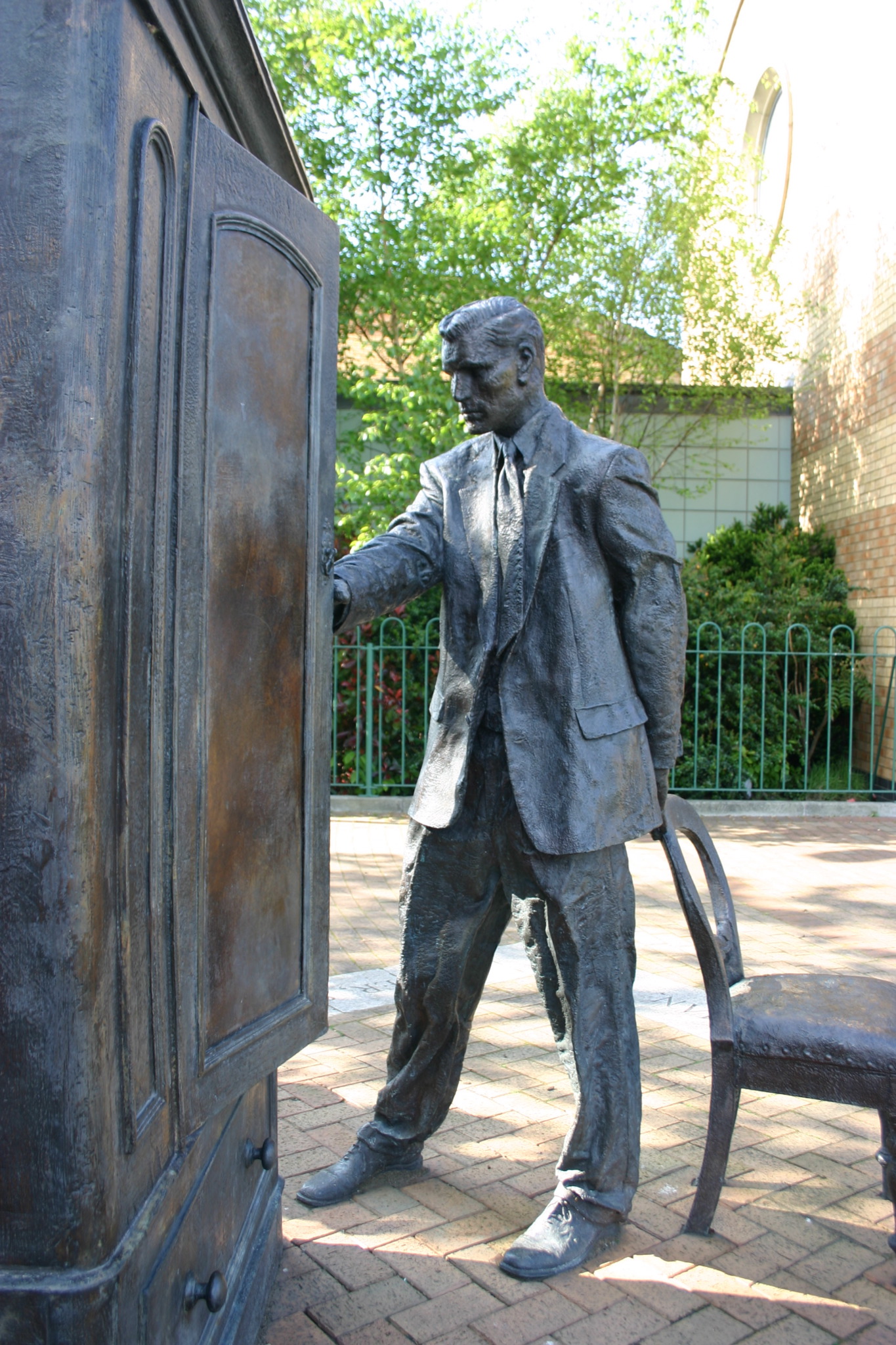“Je suis un païen converti vivant au milieu de puritains apostats.”
en
Surpris par la joie (Surprised by Joy, 1955)
Clive Staples Lewis, plus connu sous le nom de C. S. Lewis, né à Belfast le 29 novembre 1898 et mort à Oxford le 22 novembre 1963, est un écrivain et universitaire britannique. Il est connu pour ses travaux sur la littérature médiévale, ses ouvrages de critique littéraire et d'apologétique du christianisme, ainsi que pour la série des Chroniques de Narnia parues entre 1950 et 1957.
Ami très proche de J. R. R. Tolkien, l'auteur du Seigneur des anneaux, il enseigne à ses côtés à la faculté de littérature anglaise de l'université d'Oxford ; ils faisaient tous deux partie du cercle littéraire des Inklings. Partiellement en raison de l'influence de Tolkien et de la lecture de G. K. Chesterton, Lewis s'est reconverti au christianisme, devenant, selon ses propres termes, « un très ordinaire laïc de l'Église d'Angleterre » ; cette reconversion a eu de profondes conséquences sur son œuvre. Il a acquis une grande popularité par les chroniques radiophoniques sur le christianisme qu'il a données au cours de la Seconde Guerre mondiale et obtenu un énorme succès avec ses livres de fantasy pour enfants.
Les œuvres de C. S. Lewis ont été traduites en plus de 40 langues et le recueil des Chroniques de Narnia s'est vendu à plus de 120 millions d'exemplaires dans le monde et continue à se vendre au rythme de plus d'un million d'exemplaires par an. Le Monde de Narnia a également été adapté à plusieurs reprises au théâtre et au cinéma.
Wikipedia

“Je suis un païen converti vivant au milieu de puritains apostats.”
en
Surpris par la joie (Surprised by Joy, 1955)
The Silver Chair (1953), Ch. 16: The Healing of Harms
The Chronicles of Narnia (1950–1956)
"On Three Ways of Writing for Children" (1952) — in Of Other Worlds: Essays and Stories (1967), p. 24
"Bluspels and Flalansferes: A Semantic Nightmare", Rehabilitations and Other Essays (1939)
Book I, Chapter 5, "We Have Cause to Be Uneasy"
Mere Christianity (1952)
“I believe Buddhism to be a simplification of Hinduism and Islam to be a simplification of Xianity.”
Letter to Sheldon Vanauken (14 December 1950), quoted in Sleuthing C. S. Lewis (2001) by Kathryn Ann Lindskoog, p. 393 http://books.google.com/books?id=8ZfLXXLZM9UC&pg=PA393&dq=%22I+believe+Buddhism+to+be+a+simplification+of+Hinduism+and+Islam+to+be+a+simplification+of+Xianity.%22
“Some day you will be old enough to start reading fairy tales again.”
The Lion, the Witch and the Wardrobe (1950), Dedication: "To Lucy Barfield"
The Chronicles of Narnia (1950–1956)
“Every story of conversion is the story of a blessed defeat.”
Foreword to Joy Davidman's Smoke on the Mountain (1954)
“Badness is only spoiled goodness.”
Book II, Chapter 2, "The Invasion"
Mere Christianity (1952)
Orual
Till We Have Faces: A Myth Retold (1956)
Orual
Till We Have Faces: A Myth Retold (1956)
"The Seeing Eye", in Christian Reflections (1967), p. 167
"The Humanitarian Theory of Punishment" (1949), p. 292
Similar statements were included in "A Reply to Professor Haldane" (1946) (see above), published posthumously.
God in the Dock (1970)
“They have an engine called the Press whereby the people are deceived.”
Source: That Hideous Strength (1945), Ch. 13 : They Have Pulled Down Deep Heaven on Their Heads
Though they lay flat the mountains and dry up the sea, Wilt thou yet change, as though God were a god?
Pilgrim’s Regress 186–187
The Pilgrim's Regress (1933)
“But what of the poor Ghosts who never get into the omnibus at all?”
'Everyone who wishes it does. Never fear. There are only two kinds of people in the end: those who say to God, "Thy will be done," and those to whom God says, in the end, "Thy will be done." All that are in Hell, choose it. Without that self-choice there could be no Hell. No soul that seriously and constantly desires joy will ever miss it. Those who seek find. To those who knock it is opened.'
Ch. 9, p. 72; part of this has also been rendered in a variant form, and quoted as:
There are two kinds of people: those who say to God, "Thy will be done," and those to whom God says, "All right, then, have it your way."
The Great Divorce (1944–1945)
“When I lay these questions before God I get no answer. But a rather special sort of 'No answer.”
It is not the locked door. It is more like a silent, certainly not uncompassionate, gaze. As though He shook His head not in refusal but waiving the question. Like, 'Peace, child; you don't understand.'
A Grief Observed (1961)
Need-love says of a woman "I cannot live without her"; Gift-love longs to give her happiness, comfort, protection — if possible, wealth; Appreciative love gazes and holds its breath and is silent, rejoices that such a wonder should exist even if not for him, will not be wholly dejected by losing her, would rather have it so than never to have seen her at all.
The Four Loves (1960)
'Oh no, child. What would become of us if they were?'"
Orual & The Fox
Till We Have Faces: A Myth Retold (1956)
“Everything is a subject on which there is not much to be said.”
Studies in Words (1960), ch. 2
“It is hard to have patience with people who say 'There is no death' or 'Death doesn't matter.”
There is death. And whatever is matters. And whatever happens has consequences, and it and they are irrevocable and irreversible. You might as well say that birth doesn't matter.
A Grief Observed (1961)